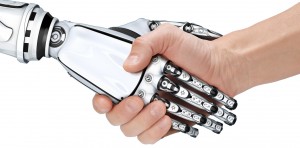
http://screenanarchy.com/assets/2015/12/ExMachina2.jpg
“Siri, where should I eat lunch”? “Ok Google, I need to buy an umbrella. Where should I go”? We have come to live in a world where we ask our phones everything from where the closest gas station is to how many stars are in our galaxy. Whether we realize it or not, artificial intelligence, has become a part of our everyday lives. The popularity of films like Ex-Machina, A.I. Artificial Intelligence, and Wall-E demonstrate our recent preoccupation with artificial intelligence and the potential uses and implications for the technology.
My last blog post got me thinking about artificial intelligence and how AI technology attempts to interpret and anticipate our emotional and physical needs. Movies like Ex-Machina capitalize on the fear that AI technology may one day develop consciousness with disastrous consequences. There is absolutely a potential to cause harm with AI technology, conscious or otherwise. I started to wonder if there was a way to instill artificial intelligence technology with a moral code, a sense of right and wrong. I was also curious to find out what the government’s stance on AI is.
An article recently published in Nature suggests that as AI technology becomes more advanced and more intelligent the only way to ensure that AI technology is benevolent is to focus programming efforts on instilling a code of ethics in AI. As for what that would look like, I’m not entirely sure. Who would be in charge of this moral code? After all, each one of us lives by our own code of ethics, which are informed by our individual world view and cultural experience.

http://cdn.phys.org/newman/gfx/news/hires/2015/thedrivetowa.jpg
As far as the government is concerned, the White House, released an official report on the future of artificial intelligence earlier this month. They laid out a plan, though not in detail, to utilize AI to increase economic growth and automate certain sectors of industry. AI is definitely something to keep an eye on as it isn’t going anywhere anytime soon.
Works Cited

Ooooh I am so, so against Artificial Intelligence. I know it can be very very beneficial if designed correctly, but I also believe that AI will make us, as a human race, even lazier. It will also, almost definitely, destroy jobs. There are some jobs out there that need very minimal training, and for some people those are the only options for employment. If we have AI taking over these jobs, where will these unemployed people go to find work? Some people may say that we could then have these people working on and fixing the machines that took their jobs. However, won’t this call for training. These people aren’t trained!
This article talks about something similar: http://www.techrepublic.com/article/ai-is-destroying-more-jobs-than-it-creates-what-it-means-and-how-we-can-stop-it/
One of my blog posts is similar to this one! After doing much research on AI, I’ve learned that it is quickly being able to complete tasks that were once only able to be done by humans. With that being said, several jobs are in danger , and the cost of living for humans is increasing. As there are a handful of plus sides to AI, there are many down sides.